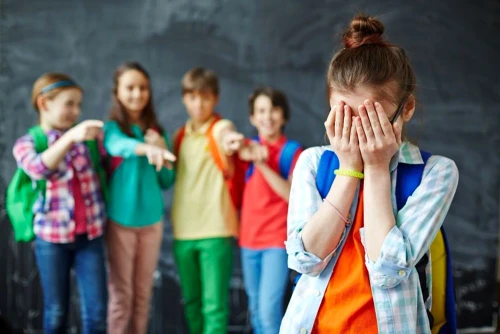In a society where violent acts are present in cartoons, news, movies, stories and video games, it is no wonder that more and more teenagers are behaving aggressively, not only in the family, but also at school. To manage to control their bouts of violence, young people need the guidance and support of their parents.

School violence is a form of emotional outburst caused by many factors such as disappointments, family problems, depression, anger, frustration and insecurity. Aggression can manifest itself verbally, mentally and physically. Another type of violence is bullying – a child or group of children using their physical power and coercion on a peer or more peers. Psychologists warn that, most of the time, aggressors come from disorganized families.
See also: The effects of bullying on Generation Z and Alpha
According to an American study published in 2014 in the journal Personality and Psychology, violent video games featuring antisocial characters increase the risk of delinquency and other harmful behaviors among teenagers.
“It was found that most antisocial or violent behaviors appear during adolescence, which can be correlated both with natural physical and hormonal changes, as well as with the need for attention and validation of personal strength. Exceeding the limits, taking risks and even aggression can be ways in which a teenager believes that he could occupy a leadership position in his group”, explains psychotherapist Livia Căciuloiu.
Info: Aggression should not be tolerated, because it causes, in turn, violence.
Give him a peaceful home
If parents are violent in front of children, they are likely to become aggressive. Moreover, if you habitually use abusive language in front of children, then there is a possibility that they will imitate you.
“Behavior models at home – and even that of teachers who are perceived as powerful, who are listened to by those around them – definitely leave their mark on how teenagers choose to act. In this way, a teenager accustomed to aggressive behavior in the family environment will naturally repeat the same behavioral pattern in the relationship with those weaker than him, outside the family”, explains the psychotherapist.
How to help your child if he is bullied
Psychologists say that in this case it is very important to listen to your child and accept his emotions and needs. Wait for him to tell you what happened to him and reassure him that he has nothing to be afraid or ashamed of what you might think of him. If he gives you the impression that he has thoughts of revenge, make him understand that his gesture will not fix the situation. Instead, you could help him find new ways to react, both if he is bullied and if he witnesses a violent action. Additionally, talk to the bully’s teachers and parents.
Read also: How to help your child who is being teased by peers
What do you do if the abuser is your own child?
If your own child is the one who assaulted someone else, it is vital to realize that his violent act can be a sign of an inner suffering that you need to find out, in order to avoid other incidents of this kind from happening again. In addition, talk to him about the consequences of his actions, and if he does not change his behavior, ask for the help of a psychotherapist.
Expert advice
Livia Căciuloiu, psychotherapist,
Even if parents cannot constantly protect their children from potential aggressive behaviors they may encounter at school, they can teach their children some healthy responses to prevent or defuse potential conflicts. It is necessary for the little ones to understand both what can fuel aggressive behavior and the natural reactions (of fear, flight, anger) that they themselves can have in these situations. By talking with them about these circumstances and possible reactions, we will help them to form alternative reactions to the conflict and at the same time increase their self-control. Equally, parents can prevent a possible alliance of the child with the aggressors by discussing the ways of reaction for the moments when they witness an aggression.






































